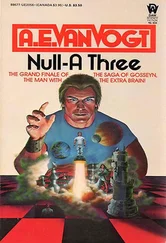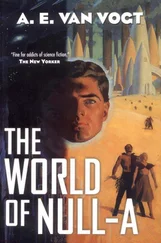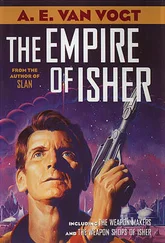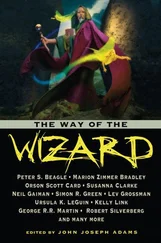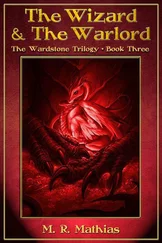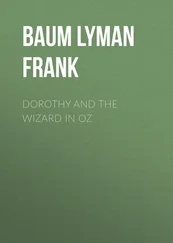A. E. Van Vogt
A note on the edition: The text of the story here is that of the original magazine editions first published in Astounding Science Fiction , not the later versions which A. E. van Vogt reworked
for various novelizations.
"The Wizard of Linn" was first published in Astounding Science Fiction in a three-part serial,
April-June, 1950.
In the deceptive darkness of space, the alien ship moved with only an occasional glint of reflected sunlight to show its presence. It paused for many months to study the moons of Jupiter, and the Risscreatures aboard neither concealed the presence of their ship, nor made a particular display of it or of themselves.
A score of times, Riss exploring parties ran into human beings. Their policy on such occasions was invariable. They killed every human who saw them. Once, on remote Titan, the hilly nature of the terrain with its innumerable caves enabled a man to evade the net they spread for him. That night, after he had had ample time to reach the nearest village, an atomic bomb engulfed the entire area.
For what it was worth, the policy paid off. Despite the casual way their ship flew over towns and villages, only the vaguest reports of the presence of a big ship were spread. And for long no one suspected that the ship was not occupied by human beings.
Their precautions could not alter the natural order of life and death. Some hours out of Titan, a Riss workman who was repairing a minor break in an instrument on the outer skin of the spaceship, was struck by a meteor. By an immense coincidence, the flying object was moving in the same direction as the ship and at approximately the same speed. The workman was killed by the blow, and swept out into space. On Europa, the largest moon, a Riss one-man exploring craf tmade its automatic return to the mother ship but without its pilot aboard. Its speedometer registered more than a thousand miles of flight, and those who tried to follow its curving back trail found themselves over mountains so precipitous that the search was swif tly abandoned. Surprisingly, both bodies were found, the former by meteor miners from Europa, the latter by troops engaged in grueling maneuvers preliminary to Czinczar's invasion of Earth. Both monstrosities were brought to the leader; and, putting together various reports he had heard, he made an unusually accurate guess as to the origin of the strange beings.
His attack on Earth took place a few months later while the alien ship was still in the vicinity of Europa. And his defeat at the hands of Lord Clane Linn followed. The machine from the stars continued its unhurried voyage of exploration. It arrived on Mars less than a month af ter Lord Jenin and his army embarked for Earth, and another month went by before its presence was reported to the Linnan military governor on Mars.
A descendant of the great Raheinl, he was a proud young man, who dismissed the first account as a tale of simple imagination, all too common in these regions where education had fallen a victim of protracted wars. But when the second report came in from another section, it struck him that this might be the Martian version of the barbarian invasion. He acted swif tly and decisively.
Police spaceships and patrol craft scoured the atmosphere. And, since the alien made no effort to avoid being seen, contact was established almost immediately. Two of the police craf twere destroyed by great flares of energy. The other ships, observing the catastrophe from a distance, withdrew hastily.
If the Riss noticed that they were now in a more highly mechanized part of the solar system, they did not by their actions let it disturb them. If they guessed that in these regions their action meant war, they seemed equally unaware of that.
The governor dispatched a warning to Earth, and then set about organizing his forces. For two weeks his patrol craft did nothing but watch, and the picture that came through was very satisfactory to the grim young man. The enemy, it appeared, was sending out exploring parties in small ships. It was these, on the fif teenth day, that the human-manned ships attacked in swarms.
The technique of assault had been very carefully worked out. In every case an attempt was made to ram the Riss craf t. Four of the attacks were successful. The smashed "lif t" boats glittered in the dull afternoon light as they fell to the flat earth below. Swiftly, spaceships darted down, drew the fallen machines aboard, and hastily took off for widely separated landing fields.
It was a major victory, greater even than was immediately suspected. The enemy reacted the following morning. The city of Gadre blew up in a colossal explosion that sent a mushroom of smoke billowing up to obscure the atmosphere for a hundred miles.
The ferocity of the counterattack ended the war on Mars. The alien was lef tstrictly alone thereaf ter. The youthful Raheinl, stunned by the violence of the response, ordered the evacuation of the larger cities, and dispatched another of a long series of warning reports to Earth. He also sent along for examination the two largest and least damaged of the enemy small craft which he had captured.
It was about a month later that he ceased to receive reports of the ship's presence inside the Martian atmosphere. He concluded that it had departed for Earth, and made out his final report on that basis. He was relieved.
The problem would now be faced by those who were in the best position to know if it could be handled at all.
Jenin put down the first report from Mars as his wife Lilidel entered the room. He rose to his feet, and gravely assisted her and the babe-in-arms she carried—their seventh child—to a chair. Then, uneasily, he returned to his own chair. He had an idea that he was going to hear more about a certain person.
Lilidel began at once. And, as he had expected, it was about his brother, Clane. He listened politely, with a sense of dissatisfaction in her, a feeling of exasperation that came to him whenever she tried to influence his judgment for emotional reasons. When she had gone on for several minutes, he interposed gently:
"My dear, if Clane had wanted to seize control, he had two whole months between the end of the barbarian war and my return."
She waited respectfully while he spoke. Lilidel—he had to confess it—was a remarkable wife. Dutiful, good, gracious, discreet, and with an unblemished past, she was, as she had pointed out many times, a model among the women of noble birth.
Jenin could not help wondering at times what it was about her that annoyed him. It made him unhappy that he had to have thoughts like that. Because, considered in individual segments, her character was perfect. And yet, the woman-as-a-whole irritated him at times to the point of distraction. Once more, he spoke:
"We have to recognize that Clane conducted the barbarian invasion campaign with remarkable skill. I still don't quite see how it was done."
He realized immediately that he had said the wrong thing. It was a mistake, according to Lilidel, to be too generous with appreciation for the merits of other men. Clane had only performed his duty. There was no reason why he should not retreat now into private life, and restrict his ambition for the good of the family and of the state.
Jerrin listened unhappily. He was seriously dissatisfied with the way he had acted towards his brother's victory. At the very least, a Triumph should have been offered Clane. And yet, his advisers in the Patronate had persuaded him that such recognition would be highly dangerous.
Читать дальше



